Merchant Marines and Mesothelioma
Many Merchant Marines See Health Set Sail with Mesothelioma
You sail the high seas. You ply the waters of the Great Lakes. You glide up and down rivers connecting inland American cities to ports along the coast.
You’re a merchant marine.
You’re also at moderate to high risk for mesothelioma because life aboard ship puts you in constant contact with asbestos, a toxic mineral.
Asbestos can be found almost everywhere below deck in a ship that’s old enough. For example:
- Paint
- Ropes
- Boiler gaskets and coatings
- Electrical insulation
Asbestos is to a ship what popcorn is to a microwave oven — a perfect pairing. If asbestos is inside a ship, it’s there to contain boiler, turbine and machinery heat.
It’s also there to prevent a fire that starts in one compartment from spreading to others and melting the bulkheads. And it makes things stronger and longer-lasting, such as when it’s used as a paint additive.
Asbestos Floating Around

The problem for you is that asbestos gets into the air you breathe.
This happens anytime you or another crewman — an engineer, oiler, firemen, wiper, or seaman, practically anyone — does something to disturb the asbestos onboard.
For example, say the boiler needs maintenance. That one piece of equipment often features many components that contain asbestos. If any of those components are removed and worked on in some fashion, the asbestos contained within them will break loose.
The freed asbestos is in the form of very tiny fibers, not much bigger than dust flakes. In fact, in the air, they behave in the same way. Mainly they float and stay up for days.
If they settle, the fibers are easily stirred back up into the air by nothing more than the breeze caused by a hatch opening or closing, or by the slipstream of a crewman walking past.
It doesn’t help at all that many of the spaces below deck where you encounter asbestos are enclosed and not well-ventilated.
So you end up inhaling the asbestos, which penetrates way down deep into your lungs and becomes trapped there. You can’t expel it by coughing or by any other means.
In the decades to come, the trapped asbestos fibers cause the healthy cells that line the outside of your lungs to mutate into cancer — mesothelioma.
Union-Flagged Mesothelioma Patients
As a merchant marine, you might belong to one of the more than a dozen specialized unions geared to men and women in your profession.
Seafarers International Union is the umbrella organization for nearly all of those unions. SIU represents 35,000 mariners, fishermen and boatmen working aboard vessels flying either the U.S. or Canadian flag. SIU members man vessels traversing the deep seas, the Great Lakes and inland waterways.
The union’s main goal is to push shipowners to do all that is possible to ensure workplace safety. For that reason, the union takes great pride in its success at convincing government to adopt laws and safeguards that reduce the risk of asbestos exposure.
Belonging to the SIU gives you access to healthcare benefits. These benefits will be worth their weight in gold when your mesothelioma treatment bills start arriving in the mail.
Treatment is very expensive, so it’s easy for a mesothelioma victim to be quickly swamped by the costs.
Belonging to the SIU also gives you access to educational programs designed to keep you healthy despite there being asbestos in your world.
Take advantage of what’s available. Contact the SIU for more details.
